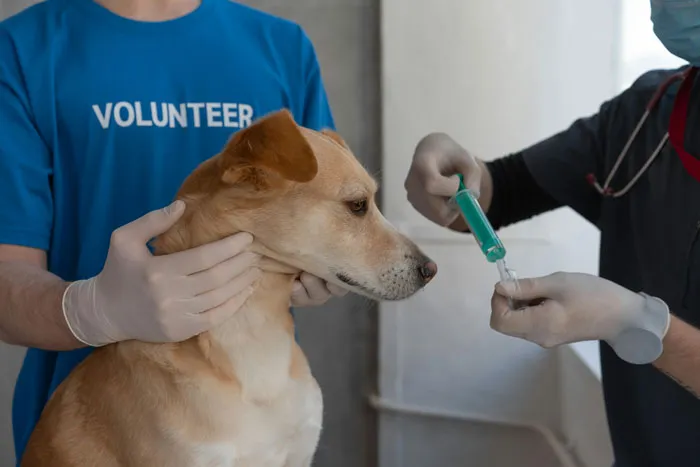
Heartworm disease is a serious problem for pet owners. It comes from a parasite called Dirofilaria immitis and primarily affects dogs, but also poses a threat to a variety of other animals. Infection occurs through a mosquito bite and can lead to serious consequences in affected dogs, including heart failure, pulmonary complications, and organ damage.
The severity of heartworm disease highlights the importance of prevention. It is very important for owners to carefully monitor their pet’s health. This impact can be significantly reduced with timely awareness and intervention. This highlights the importance of regular veterinary exams and heartworm tests to protect your dog’s health.
Understanding the central role that mosquitoes play in transmitting heartworm disease to dogs is paramount to effective prevention strategies.
The Heartworm Life Cycle:
- Initial Infection: Mosquitoes become carriers of heartworm larvae by biting infected animals.
- Development within Infected Mosquito: These larvae undergo maturation within the mosquito, transitioning into a form capable of infecting dogs.
- Transmission to Dogs: Infected mosquitoes transfer larvae onto the skin of dogs during bites, allowing entry into the bloodstream.
- Maturation: Larvae migrate to the heart and lungs of dogs, where they mature into adult heartworms, leading to severe illness.
Mosquito Species and Heartworm:
- More than 70 species of mosquitoes are capable of spreading heartworm, contributing to its global prevalence.
Recognizing the Symptoms of Heartworm Disease:
Early detection is crucial for effective management. Symptoms can range from mild to severe, including:
- A persistent, mild cough
- Fatigue, especially following activity
- Reduced exercise tolerance
- Decreased appetite and subsequent weight loss
Advanced Symptoms:
As the disease progresses, symptoms worsen, potentially leading to life-threatening complications such as:
- Severe reduction in exercise capacity
- Persistent, severe coughing with possible blood
- Difficulty breathing, even at rest
- Signs of heart failure, including hepatomegaly, ascites, and arrhythmias
- In severe cases, dogs may experience caval syndrome, characterized by sudden collapse due to blood flow obstruction.
Stages of Heartworm Disease:
- Classified into four classes based on symptoms and test results, ranging from asymptomatic (Class I) to life-threatening (Class IV – Caval Syndrome).
The Importance of Early Detection in Heartworm Disease:

Early detection significantly enhances treatment outcomes and prevents progression to severe stages, reducing the risk of mortality.
Annual Testing Recommendations:
- Dogs over seven months old require yearly testing before commencing preventive medication.
Geographic Considerations:
- Heartworm disease is rapidly spreading across the United States, necessitating annual testing and year-round preventive medication for all dogs, regardless of location.
Severity Factors in Heartworm Disease:
- Disease severity depends on factors such as worm burden, duration of infection, and the dog’s activity level.
Early Detection Benefits:
- Timely identification increases the likelihood of successful treatment and prevents the onset of serious complications.
Diagnostic Procedures:
Various tests, including antigen and microfilaria tests, along with imaging techniques such as radiography and echocardiography, aid in diagnosis.
Guidelines and Recommendations:
- The American Heartworm Society advocates for regular testing and adherence to preventive measures to mitigate heartworm disease.
Treatment Options for Heartworm Disease:

- Treatment involves multiple stages, including stabilization, adulticide treatment, and post-treatment care, with the aim of eliminating heartworms and preventing complications.
Heartworm Prevention in Dogs:
Regular administration of preventive medication and annual testing are crucial for mitigating the risk of heartworm infection.
Role of the American Heartworm Society and Expert Bodies:
- The American Heartworm Society provides updated guidelines and recommendations to veterinarians and pet owners to combat heartworm disease effectively.
In conclusion, a comprehensive understanding of heartworm disease, coupled with proactive prevention measures and regular testing, is essential for safeguarding the health of dogs and minimizing the impact of this potentially fatal condition.

I am a dedicated writer, specializes in crafting captivating content centered around Dogs. With a keen eye for detail and a passion for dogs, I delivers engaging narratives that celebrate the bond between humans and their Doggos.


